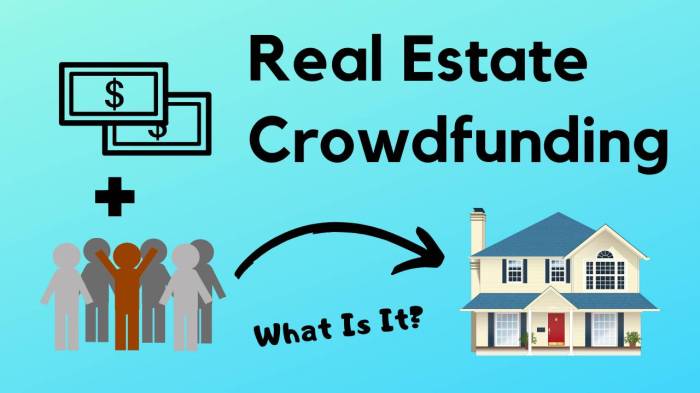Get ready to dive into the world of real estate crowdfunding, where opportunities are endless and investments are just a click away. This dynamic industry is changing the game, bringing together investors and projects in a whole new way.
Real Estate Crowdfunding Overview
Real estate crowdfunding is a method of raising capital from a large number of individuals to fund real estate projects. This allows investors to pool their resources and invest in properties that would typically be out of reach for individual investors.
Key Players in Real Estate Crowdfunding
- Platforms: Websites that connect investors with real estate developers looking for funding.
- Investors: Individuals looking to invest in real estate projects without the hassle of property management.
- Developers: Companies or individuals seeking funding for their real estate projects.
Benefits of Real Estate Crowdfunding
- Diversification: Investors can spread their investment across multiple properties, reducing risk.
- Accessibility: Allows smaller investors to participate in real estate projects that would typically require a large amount of capital.
- Transparency: Platforms provide detailed information about the properties, allowing investors to make informed decisions.
How Real Estate Crowdfunding Works
Real estate crowdfunding works by allowing individual investors to pool their money together in order to invest in real estate projects. This is usually done through online platforms that connect investors with developers or project sponsors looking for funding.
Investing Process
Investing in real estate through crowdfunding platforms typically involves the following steps:
- Signing up on a crowdfunding platform and creating an account.
- Browsing through available real estate projects and choosing one to invest in.
- Deciding on the amount to invest and completing the investment transaction.
- Receiving updates on the progress of the project and potential returns on investment.
Role of Crowdfunding Platforms
Crowdfunding platforms play a crucial role in facilitating the connection between investors and real estate projects. They provide a marketplace where investors can browse through different opportunities, conduct due diligence, and make informed investment decisions. Additionally, these platforms handle the legal and administrative aspects of the investment process, making it easier for individual investors to participate in real estate projects.
Successful Projects
Some examples of successful real estate crowdfunding projects include:
- Renovation of a historic building in downtown Los Angeles, which generated significant returns for investors.
- Development of a luxury resort in the Caribbean, attracting investors from around the world.
- Construction of a mixed-use property in a growing urban area, providing investors with steady rental income.
Types of Real Estate Crowdfunding

Real estate crowdfunding can be classified into two main types: equity-based and debt-based crowdfunding. Each type has its own set of risks and benefits, so investors need to understand the differences before getting involved.
Equity-Based Real Estate Crowdfunding
Equity-based crowdfunding involves investors purchasing a stake in a real estate project. In return, they receive a share of the profits generated from the property. This type of crowdfunding allows investors to have ownership in the property and potentially benefit from its appreciation over time.
- Investors have the potential for higher returns compared to debt-based crowdfunding.
- Risks include the property not performing as expected, leading to lower profits or even losses.
- Investors may have less control over the management of the property compared to traditional real estate investments.
Debt-Based Real Estate Crowdfunding
Debt-based crowdfunding involves investors lending money to real estate developers or projects in exchange for interest payments. Investors act as lenders and receive fixed returns based on the interest rate agreed upon.
- Investors have a more predictable income stream with debt-based crowdfunding.
- Risks include the borrower defaulting on the loan, leading to potential loss of principal investment.
- Investors do not have ownership in the property, so they do not benefit from any appreciation in value.
Comparison of Real Estate Crowdfunding Platforms
There are various models of real estate crowdfunding platforms, each offering different features and investment opportunities. Some platforms focus on specific types of real estate projects, while others offer a diverse range of options for investors.
- Some platforms require a minimum investment amount, while others allow investors to participate with smaller sums.
- Platform fees and structures can vary, impacting the overall return on investment for investors.
- Investors should research and compare different platforms to find the one that aligns with their investment goals and risk tolerance.
Regulations and Legal Considerations
When it comes to real estate crowdfunding, there are specific regulations and legal considerations that must be taken into account to ensure compliance and protect investors.
Regulations in Different Countries
In the United States, real estate crowdfunding is regulated under the JOBS Act, which allows for both accredited and non-accredited investors to participate in certain types of crowdfunding projects. The Securities and Exchange Commission (SEC) oversees these regulations to protect investors from fraud and ensure transparency in the market.
In the United Kingdom, the Financial Conduct Authority (FCA) regulates real estate crowdfunding platforms to ensure they comply with anti-money laundering regulations and investor protection rules.
Legal Requirements for Participation
To participate in real estate crowdfunding, investors must meet certain legal requirements depending on the country and the specific platform. These requirements may include income or net worth thresholds for accredited investors, as well as restrictions on the amount of money that can be invested in a single project.
Investor Protections
Investor protections in real estate crowdfunding projects typically include disclosure requirements, where platforms must provide detailed information about the project, the developer, and the potential risks involved. Additionally, investors may have the right to withdraw their investment within a certain timeframe if the project does not meet certain milestones or objectives.
